
French postcard by Cinémagazine-Edition, no. 29. Photo: Evans, L.A.

German postcard by Ross Verlag, no. 665/1. Photo: Hansaleih. Charlie Chaplin and Jackie Coogan in The Kid (Charles Chaplin, 1921).
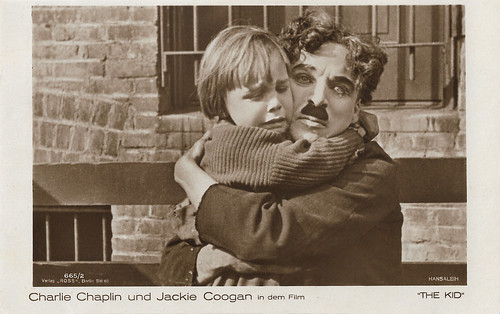
German postcard by Ross Verlag, no. 665/2. Photo: Hansaleih. Charlie Chaplin and Jackie Coogan in The Kid (Charles Chaplin, 1921).

German postcard by Ross Verlag, no. 662/2. Photo: Terra-Verleih. Jackie Coogan in My Boy (Albert Austin, Victor Heerman, 1921). The wealthy lady is Mathilde Brundage, who plays the boy's grandmother.

German postcard by Ross Verlag, no. 662/4. Photo: Terra-Verleih. Jackie Coogan and Mathilde Brundage in My Boy (Albert Austin, Victor Heerman, 1921). The old man is Claude Gillingwater, who plays Captain Bill.
The Kid
Jackie Coogan was born John Leslie Coogan in 1914 in Los Angeles, California, to John Henry Coogan Jr. and Lillian Rita (Dolliver) Coogan. His father was a dancer and actor, and his mother had been a child star. Jackie's younger brother, Robert Coogan, also would become an actor.
His parents put Jackie on stage as part of their act when he was just 16 months old. His film debut was an uncredited role as a baby in the successful silent film Skinner's Baby (Harry Beaumont, 1917), starring Bryant Washburn.
Charlie Chaplin discovered him in the Orpheum Theatre, a vaudeville house in Los Angeles, on the stage doing the shimmy, a dance popular at the time. Jackie Coogan was a natural mimic and delighted Chaplin with his abilities. Chaplin cast him in a small role in A Day's Pleasure (Charles Chaplin, 1919) to test Jackie. It proved that he had a screen presence.
Coogan then was the Tramp's irascible companion in The Kid (Charles Chaplin, 1921). Charlie raises the kid and then loses Jackie. The film was very successful.
The following year Jackie played the title role in Oliver Twist (1922), directed by Frank Lloyd. By 1923, when he made Daddy (E. Mason Hopper, 1923), he was one of the highest-paid stars in Hollywood. He would leave First National for MGM where they put him into Long Live the King (Victor Schertzinger, 1923). Coogan was one of the first stars to be heavily merchandised. Peanut butter, stationery, whistles, dolls, records, and figurines were among the Coogan-themed merchandise on sale.

German postcard by Ross Verlag, no. 725/2, 1925-1926. Photo: Transocean-Film Co., Berlin. Jackie Coogan in Oliver Twist (Frank Lloyd, 1922).

British postcard presented with The Penny Magazine. Photo: First National. Jackie Coogan in Oliver Twist (Frank Lloyd, 1922).

French postcard by Imp. Lison for Cinéma du Brun-Pain, 1923. Photo: Gaumont / Sol Lesser. Jackie Coogan in Trouble (Albert Austin, 1922).

German postcard by Ross Verlag, no. 669/6. Photo: Transocean Film Co., Berlin. Jackie Coogan in Daddy (E. Mason Hopper, 1923). Postcard mailed in the former Kingdom of Serbs, Croats, and Slovenes (Yugoslavia).

German postcard by Ross Verlag, Berlin, no. 701/3. Photo: Transocean-Film-Co., Berlin. Jackie Coogan in Daddy (E. Mason Hopper, 1923).

German postcard by Ross Verlag, no. 701/4. Photo: Transocean-Film-Co., Berlin. Jackie Coogan in Daddy (E. Mason Hopper, 1923).

Italian postcard. Photo: First National. Jackie Coogan and Peaches Jackson in Circus Days (Edward F. Cline, 1923).
A children's crusade
The photo in Berlin above was taken during Coogan's European tour in 1924. According to Wikipedia, Coogan, working with Near East relief, toured across the United States and Europe in 1924 on a 'Children's Crusade' as part of his fundraising drive. His fundraising provided more than $1 million in clothing, food, and other contributions for Armenian and Greek children displaced during World War I (worth $15 million in 2019 dollars). He was honoured by officials in the United States, Greece, and Rome, where he had an audience with Pope Pius XI.
In addition, the tour promoted Coogan's film A Boy of Flanders (Victor Schertzinger, 1924), which, oddly enough, takes place in the Netherlands and not in Belgium (of which Flanders is a part). Coogan was also dressed up in a typical Volendam (Dutch) folklorist outfit. In The Netherlands, the film was therefore baptised 'Een Hollandsche jongen' (A Dutch Boy).
According to the newspapers, in September 1924 Coogan docked in Southampton and then visited London, Paris, Rome, and Athens. After ten days of holidays in early October in Semmering (Austria), the trip continued to Budapest, Vienna, and Berlin. Attempts to have him visit Amsterdam as well failed. After a return to Paris, he took the ship back to the US on 4 November, as he had to work from 28 October on the film sets again.
Coogan was tutored until the age of 10 when he entered Urban Military Academy and other prep schools. He attended several colleges, as well as the University of Southern California.
By 1927, at the age of 13, Coogan had grown up on the screen and his career was starting to go through a downturn. His popular film career would end with the classic tales of Tom Sawyer (John Cromwell, 1930) and Huckleberry Finn (Norman Taurog, 1931) with Junior Durkin. In 1932, he dropped out of Santa Clara University because of poor grades.
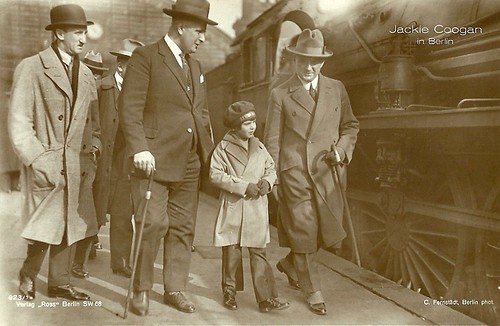
Jackie Coogan in Berlin. German postcard by Ross Verlag, Berlin, no. 923/1. Photo: C. Fernstädt, Berlin. The man at the far left is Coogan's father, John Henry Coogan Jr.

Jackie Coogan on board of SS Leviathan in 1924. French postcard by A.N. in the Les Vedettes de Cinéma series, Paris, no. 88. Photo: Rol. On 4 November 1924, Jackie Coogan went back to the US on the SS Leviathan, after his European tour of September-October that year, visiting London, Paris, Rome, Athens, Budapest, Vienna, and Berlin.

Hungarian postcard by FMSI, no. 84. Photo: Mûvèsz Film. In 1924 Coogan visited Budapest during his grand European tour. The photo refers to Coogan's outfit in A Boy of Flanders (Victor Schertzinger, 1924). Mûvèsz Film may have been the Hungarian distributor of that film.
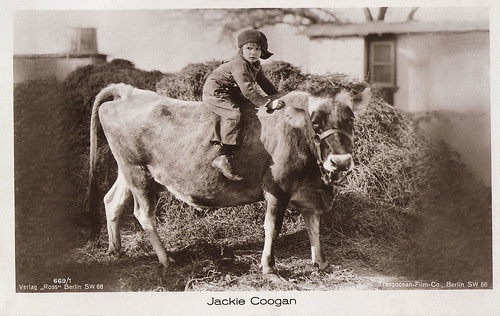
German postcard by Ross Verlag, no. 669/1, 1919-1924. Photo: Transocean-Film-Co., Berlin. Jackie Coogan in A Boy of Flanders (Victor Schertzinger, 1924).

German postcard by Ross Verlag, no. 680/2, 1919-1924. Photo: Transocean-Film-Co., Berlin. Jackie Coogan in A Boy of Flanders (Victor Schertzinger, 1924).

German postcard by Ross Verlag, no. 726/1, 1925-1926. Photo: Transocean-Film-Co., Berlin.
The Coogan Act
In 1935, 20-year-old Coogan was the sole survivor of a car crash in the California mountains. The accident killed his father; his best friend, 19-year-old actor Junior Durkin; their ranch foreman, Charles Jones; and actor and writer Robert J. Horner. The party was returning from a day of dove hunting over the border in Mexico in early May. With his father at the wheel, the car was forced off the mountain highway near Pine Valley by an oncoming vehicle and rolled down an embankment. Jackie would later call it the single saddest day of his life.As a child star, Jackie Coogan earned an estimated $3 to $4 million (now $56 to $75 million). When he turned 21 in 1935, his fortune was believed to be well intact. His assets had been conservatively managed by his father, who had died in a car accident five months earlier. However, Coogan found that the entire amount had been spent by his mother and stepfather, Arthur Bernstein, on fur coats, diamonds, other jewellery, and expensive cars. Bernstein had been a financial adviser for the family and married Coogan's mother in late 1936. Coogan's mother and stepfather claimed Jackie enjoyed himself and simply thought he was playing before the camera. She insisted, "No promises were ever made to give Jackie anything", and claimed he "was a bad boy". Coogan sued them in 1938, but after his legal expenses, he received just $126,000 of the $250,000 remaining of his earnings.
Because of the public uproar, in 1939 the California Legislature passed the Child Actors Bill, also known as 'the Coogan Act', which would set up a trust fund for any child actor and protect his earnings. It required that a child actor's employer set aside 15% of the earnings in a trust (called a Coogan account), and specified the actor's schooling, work hours, and time off. When Jackie Coogan fell on hard times and asked Charlie Chaplin for assistance, Chaplin handed him $1,000 without hesitating. Although he eventually reconciled with his mother and stepfather after the lawsuit over his earnings, things were never the same, and his advice to future child stars was to "stay away from mothers."
In 1938, Jackie Coogan appeared with then-wife Betty Grable in the musical comedy College Swing (Raoul Walsh, 1938) starring George Burns, Gracie Allen, Martha Raye and Bob Hope. It was followed by supporting roles in Million Dollar Legs (Nick Grinde, 1939) and Sky Patrol (Howard Bretherton, 1939). In 1940, Coogan played the role of a playboy Broadway producer in the 'Society Girl' program on CBS radio. He also starred in his own radio programme, 'Forever Ernest' (1946), on CBS.
Coogan enlisted in the U.S. Army in March 1941. After the attack on Pearl Harbor that December, he requested a transfer to the Army Air Forces as a glider pilot because of his civilian flying experience. After graduating from the Advanced Glider School with the Glider Pilot aeronautical rating and the rank of Flight Officer, he volunteered for hazardous duty with the 1st Air Commando Group. In December 1943, the unit was sent to India. He flew British troops, the Chindits, under General Orde Wingate on 5 March 1944, landing them at night in a small jungle clearing 100 miles (160 km) behind Japanese lines in the Burma Campaign.
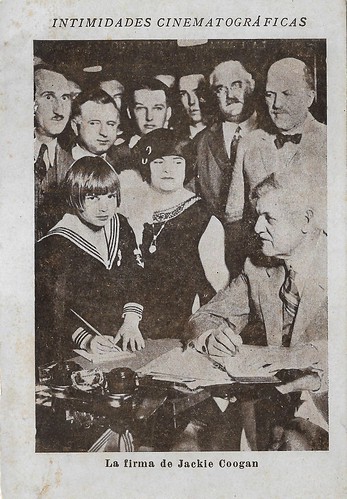
Spanish minicard (collector's card). Series Intimidades cinematograficas, series I, card 1 of 20. Caption: Jackie Coogan's signature. In the presence of his parents and Sam Goldwyn, Jackie Coogan signs a contract for his first film with Metro-Goldwyn.

German postcard by Ross Verlag, Berlin, no. 822/1. Photo: British-American-Films A.-G. (Bafag). Jackie Coogan in Long Live the King (Victor Schertzinger, 1923).

German postcard by Ross Verlag, Berlin, no. 822/2. Photo: British-American-Films A.-G. (Bafag). Jackie Coogan in Old Clothes (Edward F. Cline, 1925).

Italian postcard, no. 413. Photo: Metro Goldwyn Pictures. Jackie Coogan and Max Davidson in The Rag Man (Edward F. Cline, 1925).

German postcard by Ross Verlag, no. 3256/1, 1928-1929. Photo: Metro-Goldwyn-Mayer.

German postcard by Ross Verlag, no. 3530/1, 1928-1929. Photo: Metro-Goldwyn Mayer. Jackie Coogan in Buttons (George W. Hill, 1927).

German postcard by Ross Verlag, no. 3530/2, 1928-1929. Photo: Metro-Goldwyn-Mayer.
Uncle Fester
After the war, Jackie Coogan returned to acting, but he was unable to restart his career. He worked in B-films, mostly in bit parts and usually playing the heavy. During the 1950s, he started to appear on television. From 1952 to 1953, he played Stoney Crockett on the syndicated series Cowboy G-Men. In Denmark, he directed and starred in the thriller Flugten til Danmark/Escape from Terror (George Coogan, Jackie Coogan, 1955)
Coogan guest-starred on NBC's The Martha Raye Show. He appeared too, as Corbett, in two episodes of NBC's The Outlaws (1960-1962) with Barton MacLane. He had a regular role in the NBC series, McKeever and the Colonel (1962-1963). Coogan finally found his most famous television role as Uncle Fester in ABC's The Addams Family (1964–1966). ;When he was cast as Uncle Fester, Coogan was 50 years old and nearly broke. After the series ended in 1966, he never lacked work again, with numerous television and film appearances.
In the cinema, Coogan appeared as a police officer in the Elvis Presley comedy Girl Happy (Boris Sagal, 1965) and in A Fine Madness (Irvin Kershner, 1966) with Sean Connery. On TV, he appeared four times on Perry Mason (1966). He was a guest several times on The Red Skelton Show and appeared twice on The Brady Bunch. He also played Jeannie's uncle, Suleiman – Maharajah of Basenji in I Dream of Jeannie (1969). He continued to appear in TV series and feature films until his death. His final appearance was in the horror film The Prey (Edwin Brown, 1983).
Coogan was married four times and had four children. His first three marriages to actresses were short-lived. He and Betty Grable were engaged in 1935 and married in 1937, and they divorced less than two years later in 1939. Eighteen months later in 1941, he married Flower Parry. They had one son, John Anthony Coogan in 1942. They divorced in 1943. Coogan married his third wife, Ann McCormack in 1946. They had a daughter, Joann Dolliver Coogan, born in 1948. They divorced in 1951. Dorothea Odetta Hanson, also known as dancer Dorothea 'Dodie' Lamphere, became Coogan's fourth wife in 1952 and they were together for over thirty years, until his death. She died in 1999. They had two children together, a daughter, Leslie Diane Coogan (1953) and a son, Christopher Fenton Coogan (1967), who died in a motorcycle accident in Palm Springs in 1990.
After suffering from heart and kidney ailments, Jackie Coogan succumbed to heart failure in 1984, at age 69, in Santa Monica, California. He had previously suffered several strokes and had been undergoing kidney dialysis when his blood pressure dropped. Coogan was taken to Santa Monica Hospital, where he died from cardiac arrest. He was buried at Holy Cross Cemetery in Culver City. In 1972, Charles Chaplin returned to the U.S. after two decades of exile. He would receive the Handel Medallion in New York City and a special lifetime achievement Oscar in Hollywood. Coogan was one of several people to greet Chaplin when he arrived at Los Angeles International Airport. After greeting the other members of the party with perfunctory handshakes, Chaplin, recognised Coogan (whom he hadn't seen in decades), warmly embraced him, saying, "You know, I think I would rather see you than anybody else." Chaplin later told Coogan's wife, "You must never forget that your husband is a genius."

French postcard by Edition Cinémagazine, Paris, no. 197.

German postcard by Ross Verlag, Berlin, no. 698/2, 1919-1924. Photo: Transocean-Film-Co., Berlin.
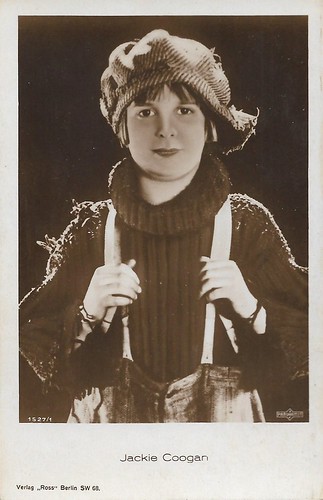
German postcard by Ross Verlag, Berlin, no. 1527/1, 1927-1928. Photo: Parufamet.

Swedish postcard by Ljunggrens Konstförlag, Stockholm, no. 161. Jackie Coogan in his outfit from Oliver Twist (Frank Lloyd, 1922).

German postcard by Ross Verlag, no. 3530/3, 1928-1929. Photo: Metro-Goldwyn-Mayer. Jackie Coogan in The Bugle Call (Edward Sedgwick, 1927).
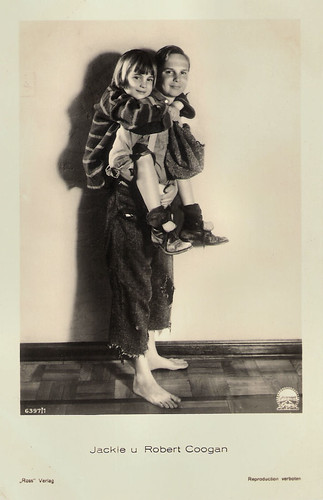
Jackie Coogan and his little brother Robert Coogan. German postcard by Ross Verlag, no. 6397/1, 1931-1932. Photo: Paramount.

German postcard by Ross Verlag, no. 9594/1, 1935-1936. Photo: Paramount.
Sources: Tony Fontana (IMDb), Wikipedia and IMDb.
This post was last updated on 22 October 2023.
2 comments:
I have a German Train Book given to Jackie Coogan . Front blank page reads “To Jackie Coogan with best compliments from German Railways Companies, Berlin 0.7 20. 1924. Then a signature that I cannot read. I believe the title is “Of Iron Horse and Paths
Jackie was a great actor and even greater kind soul
Post a Comment